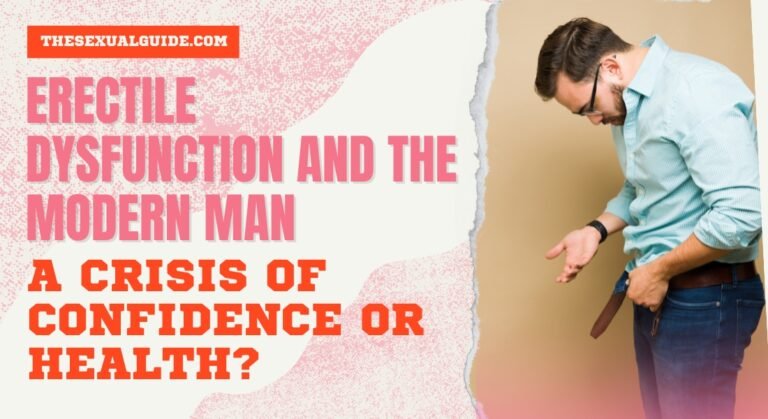Performance anxiety, particularly in intimate settings, is a common concern that can affect individuals regardless of gender or experience.
This anxiety often stems from the pressure to perform well sexually, leading to stress and potential difficulties such as erectile dysfunction (ED).
Understanding the roots of performance anxiety and implementing effective strategies can help alleviate these concerns, allowing for a more relaxed and enjoyable intimate experience.
Understanding Performance Anxiety
Performance anxiety in sexual contexts is the fear or worry about one’s ability to perform adequately during sexual activity.
This anxiety can lead to a cycle of ongoing stress and sexual dysfunction, including ED.
Common Causes
- Fear of Inadequacy: Concerns about not satisfying a partner or meeting perceived sexual standards.
- Body Image Issues: Negative perceptions about one’s physical appearance.
- Previous Negative Experiences: Past sexual difficulties can contribute to current anxiety.
- Stress and Fatigue: General life stressors and exhaustion can impact sexual performance.
Techniques to Stay Relaxed and Enjoy Intimacy
Addressing performance anxiety involves both psychological and physical strategies.
Implementing the following techniques can help reduce anxiety and enhance sexual satisfaction.
1. Open Communication with Your Partner
Discussing your feelings and concerns with your partner fosters understanding and reduces pressure.
Open dialogue can lead to mutual support and a more relaxed atmosphere.
As noted by the Cleveland Clinic, effective communication is crucial in managing sexual performance anxiety.
2. Practice Mindfulness and Relaxation Techniques
Mindfulness practices, such as meditation and deep breathing exercises, can help focus the mind and reduce anxiety.
These techniques encourage present-moment awareness, decreasing overthinking during intimate moments.
Health.com suggests that mindfulness meditation can aid in managing negative thoughts related to sexual performance.
3. Gradual Sensate Focus Exercises
Developed by Masters and Johnson, sensate focus involves structured, non-sexual touch to reduce performance pressure and enhance intimacy.
This method encourages couples to explore physical sensations without the expectation of sexual performance, gradually building comfort and connection.
4. Focus on Non-Sexual Intimacy
Engaging in activities that promote closeness without sexual expectations can strengthen emotional bonds and reduce performance pressure.
This includes spending quality time together, sharing hobbies, or simply enjoying each other’s company.
Allure.com emphasizes the importance of non-sexual forms of intimacy in maintaining connection.
5. Seek Professional Help
If anxiety persists, consulting a healthcare professional or a certified sex therapist can provide personalized strategies and coping mechanisms.
Therapists can help identify underlying causes of anxiety and work with individuals or couples to develop effective solutions.
Medical News Today highlights the role of psychological treatment and counseling in overcoming sexual performance concerns.
The Role of Erectile Dysfunction (ED) in Performance Anxiety
ED and performance anxiety are often interconnected.
Anxiety can lead to ED, and experiencing ED can increase anxiety, creating a challenging cycle.
Addressing both the psychological and physiological aspects is essential for effective management.
Understanding ED
ED is the inability to achieve or maintain an erection sufficient for satisfactory sexual performance.
It can result from various factors, including stress, anxiety, medical conditions, or lifestyle choices.
The Mayo Clinic provides comprehensive information on the causes and treatments of ED.
Managing ED-Related Anxiety
- Medical Consultation: A healthcare provider can assess and address any underlying medical issues contributing to ED.
- Therapeutic Interventions: Cognitive-behavioral therapy (CBT) and other counseling approaches can help modify negative thought patterns associated with performance anxiety.
- Medication and Devices: In some cases, medications or medical devices may be recommended to assist with erectile function.
For those seeking solutions, LibidoDepot offers a range of trusted ED treatments designed to support sexual health and confidence.
Conclusion
Overcoming performance anxiety involves a multifaceted approach that addresses both mental and physical aspects of sexual health.
By implementing open communication, mindfulness practices, and seeking professional guidance when necessary, individuals can reduce anxiety and enhance their intimate experiences.
Remember, it’s essential to approach this journey with patience and self-compassion.
Want to learn more? Visit LibidoDepot for trusted solutions and resources to support your intimate health.
FAQs: How to Overcome Performance Anxiety
1. What is sexual performance anxiety?
Sexual performance anxiety is a psychological condition where fear of underperforming in sexual situations causes stress, distraction, or avoidance. It often involves concerns about satisfying a partner, maintaining an erection, or achieving orgasm.
2. What causes performance anxiety during sex?
Common causes include low self-esteem, past negative sexual experiences, fear of judgment, unrealistic expectations from media, relationship issues, or underlying mental health conditions like anxiety or depression.
3. Can performance anxiety cause erectile dysfunction?
Yes, psychological stress from performance anxiety can lead to erectile dysfunction (ED). The worry itself triggers a stress response that interferes with arousal and blood flow, making it difficult to maintain an erection.
4. How can I reduce or eliminate sexual performance anxiety?
Effective strategies include open communication with your partner, relaxation techniques (like deep breathing and mindfulness), therapy (such as cognitive behavioral therapy), avoiding performance pressure, and addressing any underlying health or relationship issues.
References
- Sexual Performance Anxiety: Causes, Symptoms, and Treatments
- Overcoming Sexual Performance Anxiety
- Sexual Performance Anxiety: Causes and Treatments
- Male Sexual Performance Anxiety
- Sexual Performance Anxiety: Causes, Symptoms & Treatments
- Sex Therapy






